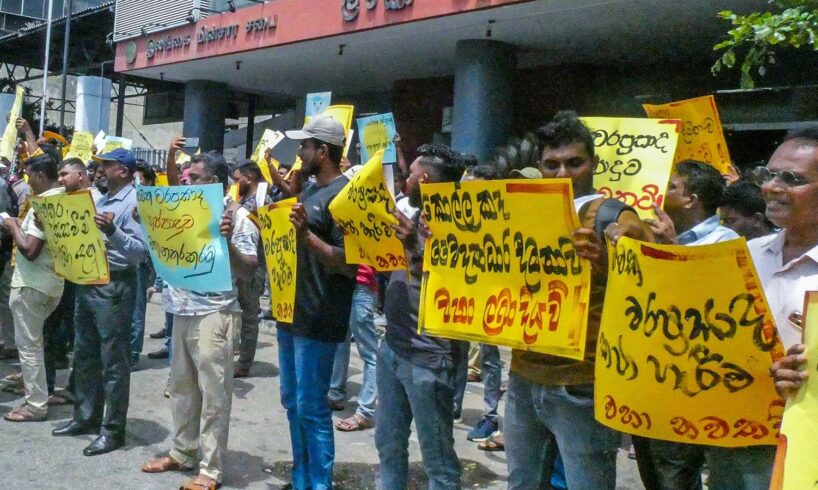
It has been a week since the 25 trade unions at the state-owned Ceylon Electricity Board (CEB) began a work-to-rule protest. According to reports, large numbers of CEB workers—in the head office, power plants and sub-centres—are participating in the industrial action.
Electricity workers protesting outside CEB head office in Colombo, July 22, 2025
The Janatha Vimukthi Peramuna/National People’s Power (JVP/NPP) government, in line with International Monetary Fund (IMF) dictates, is moving to break up the CEB into four separate companies. The government has only been able to proceed with this cost-cutting attack on the jobs, wages and working conditions of the CEB’s 22,000-strong workforce because the union leaderships fully endorse it.
The work-to-rule action has been called by an alliance of CEB unions, including the Engineers Union, the Technical Engineers and Supervisors Union, the Freedom Employees Union (FEU), the Independent Engineers Union, the CEB Technicians Union and the National Employees Union.
Leaders of the alliance have submitted a 24-point letter to the government demanding that electricity workers still receive their current salaries, pensions, allowances, working hours and promotion conditions after the CEB’s restructuring. The industrial action is to pressure the government to agree to these demands before employees are dispersed into the four new companies.
The JVP-controlled Lanka Electricity Workers’ Union (LEWU), which fully endorses the government’s austerity measures, opposes the work-to-rule action. Many LEWU members, angry over the unions pro-government stance, have resigned from the union, while a significant number of remaining members are participating in the work-to-rule.
Although electricity workers have voiced their opposition to the restructuring, the union leaderships, including those that have called the work-to-rule protest, are unwavering in their support for government’s restructuring plan.
Priyantha Prabath, general secretary of the FEU, which is affiliated with the Sri Lanka Freedom Party (SLFP), made this clear at a September 8 press conference.
“We are in favour of the restructuring. We have launched this trade union action because it [the restructuring] was being carried out in an inefficient and illegal manner,” he said. In other words, the unions bureaucracies want a more efficient imposition of the government’s restructuring/privatisation program.
Prabath added: “We are intensifying the trade union action in a way that is not felt by the consumers but felt by the government. We have decided to withdraw from the restructuring committees after September 16 and to close offices on Saturdays and Sundays. After that, we will take heavier action, such as strikes.” Falsely adopting a militant posture, Prabath said the union actions, “should not be taken lightly.”
Addressing a September 11 press conference, Dhanushka Parakramasinghe, a member of the Engineers Union’s executive committee, said that the work-to-rule was to “let the government know about our demands and open its eyes.” He admitted, however, that the government had not even agreed to a discussion.
When a WSWS correspondent asked FEU president Prabath at a September 3 press conference how workers’ rights could be protected when the new companies started cutting jobs and wages, and impose speed ups to maximise profits, he replied:
“We have proposed a memorandum of understanding between the trade unions and the government on 21 points which will protect even the last employee working in the power sector.” He added that the minister had promised to hold a meeting with the committee appointed to discuss the demands on September 15.
Justifying the government’s agreement with the IMF and its preparations to privatise the energy sector in line with that agreement, Prabath stated: “We are still a poor country, [but] we are moving forward with assistance from the IMF. Large power projects require foreign investment.”
Prabath is turning the IMF agreement upside down. The IMF is not providing Sri Lanka with a grant, but a $US3 billion bailout that must be repaid.
When Sri Lanka defaulted on foreign loans in April 2022, the IMF intervened on behalf of international bankers and other lenders, taking control of the economy and ordering Colombo to impose a harsh austerity program. The IMF measures involve a massive program of public sector restructuring and privatisation, and extracting the maximum from the working class and the rural poor, through higher taxes and cuts to social welfare programs.
President Dissanayake’s JVP/NPP government, following on from the previous Wickremesinghe administration, is stepping up these assaults, aiming to begin repayment of Sri Lanka’s foreign debt in 2028. The Sri Lankan trade union bureaucracy, including the CEB unions that are active members of the company’s restructuring committees, is an essential part of this process.
To believe it is possible to secure a “collective agreement” with the CEB management, and that those heading the future companies will support workers is a dangerous delusion. The trade union bureaucracy does not represent workers interests but is working for the IMF and the government, and has pledged to assist in attracting foreign investment.
The Dissanayake government has made clear that it will not abandon its commitment to the IMF program.
As a senior official from the Ministry of Power recently stated, the government’s restructuring program would be implemented according to “national needs,” and compulsory retirement could be implemented for those who cannot comply with restructuring.
In a direct threat against workers taking industrial actions, he added, “The public cannot be held hostage to the demands of a few.”
Last month, the Dissanayake government mobilised the police and army to break national strike action by thousands of postal workers over wages, overtime, job permanency and other demands. The postal union leadership betrayed their members, quickly calling off the strike without meeting any of its demands.
Postal and Telecommunications Minister Nalinda Jayatissa denounced the postal workers strike as “unjust,” and warned against any future industrial action by workers at the CEB or at any other public sector firm.
CEB workers must draw serious political lessons from the postal workers’ strike and their own struggles.
One worker, who agreed on the need to fight the government’s agenda, told the WSWS that some employees “think it is too late” to fight government’s restructuring program because it had already been enacted and implemented. This is a mistake.
While the government is moving ahead with its agenda in alliance with the union bureaucracy, CEB workers must organise independently of the trade union bureaucracy.
As the WSWS and the Socialist Equality Party have insisted from the outset: the fight against Dissanayake’s austerity program and restructuring assault on jobs, wages and working conditions can only go forward if it is developed outside of the control of the trade union apparatus. This means forming action committees at every CEB workplace, excluding all union bureaucrats. These committees would link up with workers in other state-owned enterprises facing the same restructuring/privatisation plans.
CEB workers must reach out to their brothers and sisters in the petroleum, postal, railway, ports, banks and other state-owned enterprises whose jobs and working conditions are being targeted by the Dissanayake government.
Responding to growing opposition to the government’s attacks, the trade union leaders have called isolated strikes and protests to dissipate workers’ anger and keep them trapped in fruitless appeals to the government.
In response, workers should mobilise their independent class strength and begin preparations for a general strike to defeat the government’s policies and fight for a socialist program.
This includes demands for the repudiation of all foreign debts and for the nationalisation of all banks, large companies, plantations and other major economic centres under workers’ democratic control. This anti-capitalist program involves the fight to bring a workers’ and peasants’ government to power as part of the struggle for international socialism.
We urge CEB workers to review these vital political issues and contact us about how to establish an action committee at your workplace.
E-mail: wswscmb@sltnet.lk
Telephone: +94773562327
Sign up for the WSWS email newsletter





